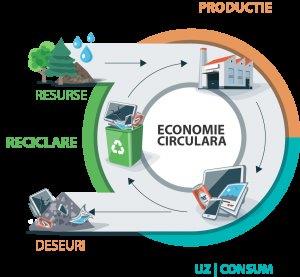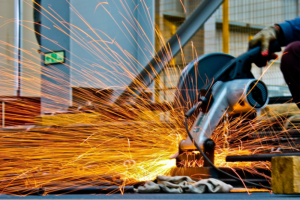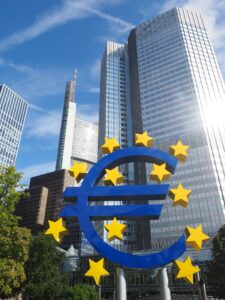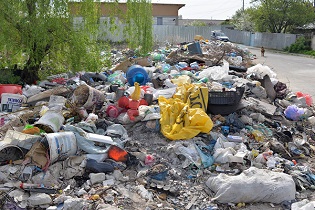 Since the beginning of this year, three bags have appeared at the refuse disposal chute of the apartment block where I live. One black, another blue and the last, yellow. For plastic, glass or aluminium containers or waste and for paper or cardboard. Beyond the unusual and the comments on the difficult adaptation to a rather simple requirement, as citizens of civilized Europe, we shall have to manage at the individual level an abstract concept, the circular economy.
Since the beginning of this year, three bags have appeared at the refuse disposal chute of the apartment block where I live. One black, another blue and the last, yellow. For plastic, glass or aluminium containers or waste and for paper or cardboard. Beyond the unusual and the comments on the difficult adaptation to a rather simple requirement, as citizens of civilized Europe, we shall have to manage at the individual level an abstract concept, the circular economy.
Simply put, the circular economy requires us to carry out our activities with minimum waste and maximum recycling. Where products are created since the design phase to be reused or recovered in whole or in part in various forms, to limit material, energy and environmental costs.
Started at the time of the EU accession from a catastrophic 0.4%, the share of household waste recycling in cities, Romania went up to 13.3%, but the value recently recorded by Eurostat remains far behind the results obtained by neighbouring countries or other colleagues from the Eastern bloc, not to mention the situation in the West, where Germany reaches a level of 66.1%.
Truth is that, after giving up a recycling system well-designed for that time, implemented in the socialist period, we have not replaced it with anything and reached the worst situation in the EU (except for the small state of Malta, where the situation worsened from 13.4% in 2007 to just 7.1% in 2016, but mass tourism shows its effects there).
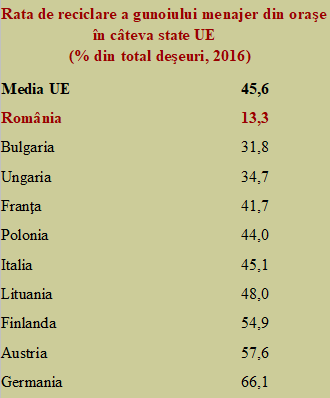 The household waste recycling rate in cities in some EU countries (% of total waste, 2016)
The household waste recycling rate in cities in some EU countries (% of total waste, 2016)- EU average
While in other sectors we can invoke the technological or productivity gap, in terms of recycling, where we must recover a huge gap to the EU average, there are no excuses. Especially because, for recycling rates that are modest from the European perspective, we need education and compliance with simple requirements rather than large investments.
Paradoxically, if we relate to GDP and the situation in other countries, these investments seem to have been made at a rather good pace, but the very low starting point and chronic delays in implementing pressing environmental measures (from building landfills to the quality of the air, where we are on the verge of infringement) have led to our position as a laggard of Europe.
The proportion of the recycling industry in GDP is 0.71% (Eurostat data are for 2015), below the EU 28 average of 1% (valid for 2014) but similar to Belgium (0.69% of GDP), Hungary (0.77% of GDP) or Portugal (0.75% of GDP), although far from Bulgaria (1.15% of GDP), which, precisely because it has a low GDP and needs to quickly catch up, decided to make a special effort in this field.
For reference, we mention that we had some more serious intentions in 2008, when we reached 1% of GDP, we went down to 0.8% of GDP during the 2010-2011 crisis and stabilized at the level of 0.7% of GDP plus/minus a few hundredths, despite our weak position.
Going back to the simple level of waste collection, even those at the refuse disposal chute of the apartment block, at least there we could do something better. Plastic bags do not cost much; the problem is, as in many aspects of our lives, what we do when nobody sees us and how we educate at least the young generation to make a jump to civilization.
Contrary to simplistic appearances, recycling is not a caprice, but a behaviour with implications of billions of euro in the long run. From the cost of other raw materials and materials, to the need to find more landfills and to the quality of life (including the costs for health), because of the increasing pollution.


